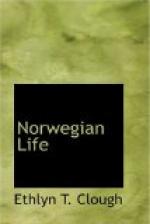The enthusiastic nationalism of Henrik Wergeland and his young following brought conflict with the conservative element, which was not ready to accept everything as good simply because it was Norwegian. This conservative element maintained that art and culture must be developed on the basis of the old association with Denmark, which had connected Norway with the great movement of civilization throughout Europe. As the political leader of this “Intelligence” party, as it was called, appeared J.S. Welhaven.
John Sebastian Cammermeyer Welhaven was born in Bergen in 1807, entered the university in 1825, became a Lector in 1840, and afterward Professor of Philosophy. “His refined esthetic nature,” says Fr. Winkel Horn, “had been early developed, and when the war once broke out between him and Wergeland, he had reached a high point of intellectual culture, and thus was in every way a match for his opponent.” The fight was inaugurated by a preliminary literary skirmish, which was, at the outset, limited to the university students; but it gradually assumed an increasingly bitter character, both parties growing more and more exasperated. Welhaven published a pamphlet, Om Henrik Wergelands Digtekunst og Poesie, in which he mercilessly exposed the weak sides of his adversary’s poetry. Thereby the minds became still more excited. The “Intelligence” party withdrew from the students’ union, founded a paper of their own, and thus the movement began-to assume wider dimensions. In 1834, appeared Welhaven’s celebrated poem, Norges Daemring, a series of sonnets, distinguished for their beauty of style. In them the poet scourges, without mercy, the one-sided, narrow-minded patriotism of his time, and exposes, in striking and unmistakable words, the hollowness and shortcomings of the Wergeland party. Welhaven points out, with emphasis, that he is not only going to espouse the cause of good taste, which his adversary has outraged, but that he is also about to discuss problems of general interest. He urges that a Norwegian culture and literature can not be created out of nothing and to promote their development it is absolutely necessary to continue the associations which have hitherto been common to both Norway and Denmark, and thus to keep in rapport with the general literature of Europe. When a solid foundation has in this manner been laid, the necessary materials for a literature would surely not be wanting, for they are found in abundance, both in the antiquities and in the popular life of Norway. Welhaven continued his effective work as a poet and critic. Through a series of romantic and lyrical poems, rich in contents and highly finished in style, he developed a poetical life, which had an important influence in the young Norwegian literary circles. He died in 1873.
Andreas Munch (1811-1884), an able and industrious poetical writer, took no part in the controversy between Wergeland and Welhaven, but followed his Danish models independently of either. His Poems, Old and New, published in 1848, were quite popular. His best work is probably Kongedatterens Brudefart, “The Bridal Tour of the King’s Daughter,” 1861.




